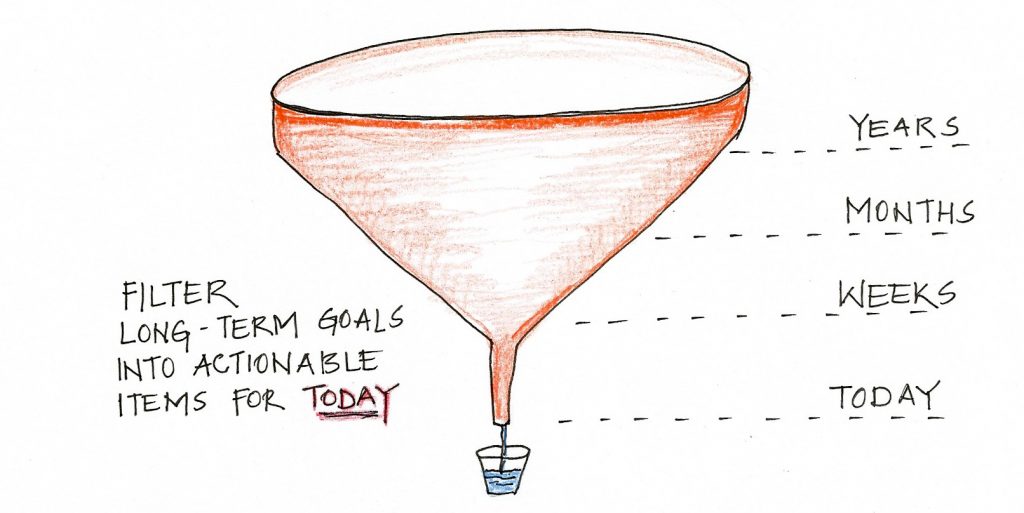Question: Our goals, emotions, personalities, life situation and priorities are always shifting. What we wanted 5 years ago is not necessarily what we want today. Even if a long-term goal is realized, it does not bring the same satisfaction that we once imagined it would. Isn’t it better to only set short term goals that align better with one’s current life situation? Why even bother with long term goals?
The purpose of setting a goal is to align your behavior and life in the present. I think this point is often missed in discussing goal-setting in general, because most people see setting a long-term goal as about (primarily) realizing that goal in your future.
In truth, you have no control over the future. You only have (some) control over your present moment. This isn’t to be fatalistic, it’s simply a fact that any change in the future is going to be because of some action you took right now.
So why set goals at all? The reason is that setting and having goals can modify how you behave in the present. This can either improve your quality of life immediately (it’s better to have a life of purpose and hope than boredom or despair), or it can make your future life better by achieving something that will improve your life.
This new perspective makes it easier to go back to the original question about setting long-term or short-term goals. You should take goals such that they modify your present behavior in such a way to improve your life either immediately or in the long-term. If the goal doesn’t change your present behavior, it’s useless. If the goal changes your behavior, but in ways that make you worse off in the now or in the future, it’s worse than useless.

Long-term goals, therefore, are useful if they are enough to motivate you to take action today. Often, this isn’t the case. A goal to be a millionaire in ten years isn’t worthwhile if you don’t do anything differently right now as a consequence. Shorter projects are often better here because they more directly inspire action. Being a millionaire in a decade doesn’t obviously lead to an action right now. But wanting to start a new business in six months might. Even better, a goal should come with some kind of plan so you know what you should be doing differently right now, rather than just a vague sense of wanting something distant.
In my own life, long-term goals have sometimes inspired a lot of motivation. Wanting to own my own business was a goal that took me eight years from when I had the idea to when I was actually able to live off of the income. There were a ton of shorter goals, plans and daily to-do items along the way, but those were intermediate motivators for a bigger dream of being self-employed.
These days, I tend to focus a lot more on projects of 1-2 years. These projects often inspire me more directly, or they push my life in directions I want to go. I don’t find I need as many specific long-term goals these days because there are few that inspire action greater than those shorter ones. However, that’s just a consequence of my life situation rather than anything specific about goal-setting.
My advice to readers thinking about their goals is to evaluate them on whether they cause you to act or feel differently right now. If they don’t, then you need to either rework them so that they do (rephrasing them in terms of habits, tasks and milestones) or you need to pick new goals. Whether they are long or short will depend on your situation and what things inspire you enough to work at them.


 I'm a Wall Street Journal bestselling author, podcast host, computer programmer and an avid reader. Since 2006, I've published weekly essays on this website to help people like you learn and think better. My work has been featured in The New York Times, BBC, TEDx, Pocket, Business Insider and more. I don't promise I have all the answers, just a place to start.
I'm a Wall Street Journal bestselling author, podcast host, computer programmer and an avid reader. Since 2006, I've published weekly essays on this website to help people like you learn and think better. My work has been featured in The New York Times, BBC, TEDx, Pocket, Business Insider and more. I don't promise I have all the answers, just a place to start.